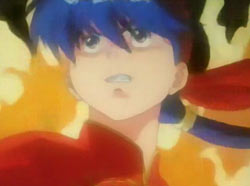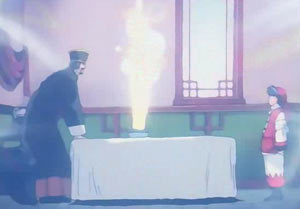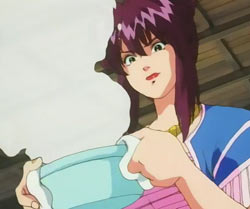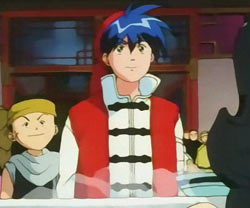Buried Treasure
Cooking Master Boy (Chukan Ichiban!)
by Justin Sevakis,
Apparently the new, less-pretentious word for "gourmand" is "foodie," and I'm a hardcore foodie. According to my friends, this is one of my most defining characteristics. The sensual pleasures of eating is how one can learn about a culture, a family, a philosophy of the one doing the cooking. It's a very important ritual for me, taking in a meal. During a trip to Anime Boston last year I was actually moved to tears by a cranberry cheesecake. Ask Bamboo. She has pictures.
My culinary obsessions swing towards Asian cuisine. I eat it at least 4 nights a week. I love it all: Chinese, Taiwanese, Malaysian, Indian, Japanese, Korean, Thai, Vietnamese... Being in New York City, none of these are particularly hard to come by, and both my wallet and my gut have suffered for it. Eating is wonderful.
When food is as important to one's happiness as it is for me, you tend to obsess on the behind-the-scenes details. The ingredients. The obscurity. The skills of the chef. With all that, it should come as a surprise to nobody that I have a certain appreciation for cooking anime and manga -- of which there are quite a few of the latter, but precious few of the former. In my research, I could only come up with about a dozen shows, most of them older and completely unfamiliar to American fans. Despite this, the Japanese tradition of food-related drama is one of the country's best known quirks, thanks to Iron Chef and, more recently, Yakitate!! Japan. My personal favorite is a fairly standard shonen series from the late 90's that, just by nature of being warm and pleasant, worked its way into my heart.
 Cooking Master Boy takes place sometime during the 1800's in China, and focuses on Liu Mao Tsing, a 13-year-old son of a famous restauranteur. When we first meet him, he's engaged in a cooking battle against a clearly devious man for the entertainment of the emperor and, when he wins, the emperor orders him to move to Guangzhou Province and apprentice at the famous Yang Spring Restaurant in order to hone his skills.
Cooking Master Boy takes place sometime during the 1800's in China, and focuses on Liu Mao Tsing, a 13-year-old son of a famous restauranteur. When we first meet him, he's engaged in a cooking battle against a clearly devious man for the entertainment of the emperor and, when he wins, the emperor orders him to move to Guangzhou Province and apprentice at the famous Yang Spring Restaurant in order to hone his skills.
Things aren't easy for him there. Being so young, the head chef tends to ignore him, and the other chefs are more intent on teasing him. But a little ingenuity goes a long way, and soon his novel problem solving gains everyone's respect -- to the point where the rivals come in full-force. Soon, Mao is being challenged left and right by other chefs, engaging in tournaments, being sabotaged and poisoned, et cetera.
 Unlike most shonen action heroes, Mao is neither a screw-up nor particularly bratty. He's simply a nice kid -- polite, earnest, and has a maturity to him that one might attribute to hardship. While there are few dire moments in the show, there's a sensitivity about him that allows him to size up a customer and decide how he might be able to touch them with his cooking. It's a subtle gift, and one that emphasizes the craftsmanship and the psychological delight behind a meal. This gentle, unassuming goal of improving other people's lives is a delightful change of pace from more typical shonen fare, which prefers to dominate and cause pain. (Not that I'm complaining, mind you.)
Unlike most shonen action heroes, Mao is neither a screw-up nor particularly bratty. He's simply a nice kid -- polite, earnest, and has a maturity to him that one might attribute to hardship. While there are few dire moments in the show, there's a sensitivity about him that allows him to size up a customer and decide how he might be able to touch them with his cooking. It's a subtle gift, and one that emphasizes the craftsmanship and the psychological delight behind a meal. This gentle, unassuming goal of improving other people's lives is a delightful change of pace from more typical shonen fare, which prefers to dominate and cause pain. (Not that I'm complaining, mind you.)
Like most shonen anime staples (and as the subject matter dictates), Cooking Master Boy is unabashed in its silliness (one rival cook goes shirtless, which must really hurt when he stir fries), but somehow manages to keep a straight face during the proceedings. Evil characters do things like cackle to themselves and hit people obnoxiously. Honest challengers tend to have mildly compelling back stories and lose to the protagonist honorably, vowing to improve themselves and perhaps face him again. There is ne'er a plot twist that will even slightly surprise anyone even slightly experienced in sports anime, fighting anime, or any other sub-genre focused on spunky young heroes who Must Do Their Best.
 And yet, there's a gleeful excitement in the air. When we see people flying through metaphorical clouds because they just ate Mao's really really amazing Mabo Tofu, it's hard not to share in their delight. Cooking is about bringing joy to those who are eating, and to us non-animated spectators, it's just as hair-raising to see what unexplainable new cullinary triumph Mao is able to pull out of his sleeve as it would be to see Naruto somehow find the strength to mold more chakra or Ippo land a perfect finishing punch. Of course, with something as distinctly non-visual as taste, the animators must find different ways of showing their excitement. Sure enough, the tasters often fly through the clouds or get lost in flashbacks, reflecting on fond memories. This is the earnest version of the cooking show that Yakitate!! Japan spent 69 episodes goofing on.
And yet, there's a gleeful excitement in the air. When we see people flying through metaphorical clouds because they just ate Mao's really really amazing Mabo Tofu, it's hard not to share in their delight. Cooking is about bringing joy to those who are eating, and to us non-animated spectators, it's just as hair-raising to see what unexplainable new cullinary triumph Mao is able to pull out of his sleeve as it would be to see Naruto somehow find the strength to mold more chakra or Ippo land a perfect finishing punch. Of course, with something as distinctly non-visual as taste, the animators must find different ways of showing their excitement. Sure enough, the tasters often fly through the clouds or get lost in flashbacks, reflecting on fond memories. This is the earnest version of the cooking show that Yakitate!! Japan spent 69 episodes goofing on.
The animation is typical of a modestly budgeted late-90's TV series. Nippon Animation is not known for lush visuals, but rather consistency -- their World Masterpiece Theater line of literary anime was a staple of Japanese television for nearly a quarter century. While pedestrian by today's standards, the design of the show happily reconstructs the vivid colors and the lush countryside of 19th Century China. Characters have a slightly rounded, chunky look, and while female tag-along Mei Li is the focus of several OP/ED sequences, nobody is winning any beauty contests. One gets the feeling that the cast consists of, simply, nice kids who are passionate about what they do. And that, by itself, is compelling.
 Of course, the foodie in me would not be content without closely inspecting the cooking conditions, the ingredients and the authenticity of the dishes in the show. Nothing is particularly outlandish (Mao often takes the time to explain the finer points of what he's doing, such as making tofu from scratch), and while the dishes being prepared are ones that are often served in Japan, nothing is served that would be too out of place for mainland China during the time period (typical Shonen silliness notwithstanding). I'm told that Chinese food is actually much more authentic in American Chinatowns than in Japan, and therefore organ meats and the more exotic herbs that those in Urban areas are familiar with are not so well represented. Enough ground is covered that all but the most avid Chinese food buffs will probably learn something. Any American who wasn't lucky enough to have grown up with dim sum and properly made noodle dishes are still likely to be surprised and delighted.
Of course, the foodie in me would not be content without closely inspecting the cooking conditions, the ingredients and the authenticity of the dishes in the show. Nothing is particularly outlandish (Mao often takes the time to explain the finer points of what he's doing, such as making tofu from scratch), and while the dishes being prepared are ones that are often served in Japan, nothing is served that would be too out of place for mainland China during the time period (typical Shonen silliness notwithstanding). I'm told that Chinese food is actually much more authentic in American Chinatowns than in Japan, and therefore organ meats and the more exotic herbs that those in Urban areas are familiar with are not so well represented. Enough ground is covered that all but the most avid Chinese food buffs will probably learn something. Any American who wasn't lucky enough to have grown up with dim sum and properly made noodle dishes are still likely to be surprised and delighted.
Cooking Master Boy moved me in a way I didn't expect. It made me dream. While most Americans have only had crappy Chinese takeout, the country's cooking is some of the most diverse, amazing and savory dishes in the world. This show filled me with the desire to travel China to sample the local dishes of all the various villages around the country. This dream lasted until a friend of mine who was Chinese and had travelled China informed me that this would be a good way to get SARS II.
| Obscure-O-Meter™ | |
| A | Abundant. Available anywhere that carries anime. |
| C | Common. In print, and always available online. |
| R1 | US release out of print, still in stock most places. |
| R2 | US release out of print, not easy to find. |
| R3 | Import only, but it has English on it. |
| R4 | Import only. Fansubs commonly available. |
| R5 | Import only, and out of print. Fansubs might be out there. |
| R6 | Import long out of print. No fansubs are known to exist. |
| R7 | Very rare. Limited import release or aired on TV with no video release. No fansubs known to exist. |
| R8 | Never been on the market. Almost impossible to obtain. |
| Adapted from Soviet-Awards.com. | |
 How to get it:
How to get it:Cooking Master Boy is out on DVD in Japan, but it seems that all the fansubs are based on the Cantonese or Mandarin versions, which are both decent and more fitting languages for the show. The fansubs are also VERY old, and could be quite hard to find nowadays. A US version with proper subtitles will be released when suckling pigs fly. The series reportedly didn't do so well in Japan -- it was cancelled after 52 episodes, and therefore the ending is pretty abrupt. However. it was very successful in Chinese-speaking territories (though the legality of DVDs from this region are difficult to determine), and a Taiwanese live action drama series of the show was created in 2006.
Screenshots © Etsushi Ogawa/Kodansha • Fuji TV • Nippon Animation 1997
discuss this in the forum (35 posts) |
